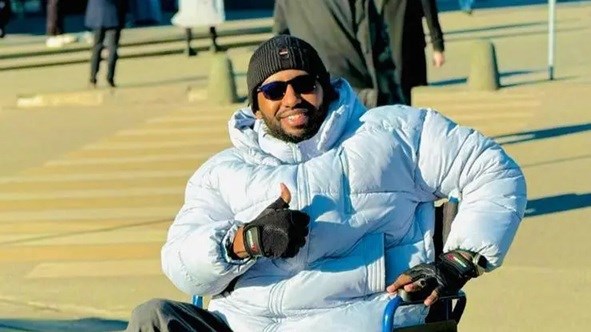
Wednesday February 26, 2025

Ahmed Abdulqadir Ahmed, known as Baaba Jeey, gives a thumbs-up while seated in a wheelchair on a bright winter day. The Somali asylum seeker, who has lived in Germany for several months, faces an uncertain future following the country’s recent elections, which saw a rise in anti-immigration sentiment. Despite the challenges, he remains hopeful for a positive outcome. Credit/ Supplied
London, UK (HOL) — Germany’s recent election delivered a decisive victory for the conservative CDU/CSU party, while the far-right, anti-immigration Alternative for Germany (AfD) secured second place. The result has heightened anxieties among migrants, particularly asylum seekers, as AfD’s potential role in a coalition government could lead to stricter immigration policies and deportations.
The election was a crushing defeat for Chancellor Olaf Scholz’s Social Democratic Party (SPD), which garnered only 14% of the vote—the party’s worst performance on record. The vote was driven by concerns over immigration and economic recovery, with Germany, Europe’s largest economy, facing growing challenges. The election followed the collapse of Scholz’s coalition late last year.
Among those most affected by the political shift are Somali migrants in Germany, many of whom fear deportation or an increasingly hostile environment.
‘My Hopes Have Been Shattered’
Ahmed Abdulqadir Ahmed, known as Baaba Jeey, is one such asylum seeker. Speaking to the BBC, he described his deep distress over the election results, fearing they could seal the fate of many migrants like himself.
“I am devastated by this outcome. I am among those in Germany awaiting legal status, and now, I fear what is coming,” he said.
Baaba Jeey arrived in Germany with high expectations, particularly of receiving medical care and support, as he has a disability. Those hopes, he says, have now been crushed.
“I believed I would get healthcare here and regain my mobility. Now, all my hopes have perished—they have fallen into an abyss,” he said.
His worst fears are already materializing. His asylum application has been rejected, and a court has denied his appeal. The authorities have now issued him a letter instructing him to leave Germany.
His future remains uncertain. He faces deportation to Poland, where he first entered the European Union, or, in a far more daunting scenario, direct repatriation to Somalia. “I have no idea how that would even happen,” he admitted.
Baaba Jeey’s journey to Germany was long and arduous, spanning six months and multiple countries, including Saudi Arabia, Russia, Belarus, and Poland. The harsh realities of migration, he says, are often overlooked.
“People don’t understand how hard this journey is. It takes courage, endurance, and patience,” he recalled. “There was a time I was abandoned for two hours before being retrieved—it was terrifying.”
He remembers his initial arrival in Germany as a moment of joy, but today, his situation feels hopeless. Still, he clings to the possibility that things may change.
Many Somali migrants in Germany share his concerns. They fear the newly elected government will take a tougher stance on immigration, tightening policies and limiting opportunities for asylum. Some worry that new arrivals will face an even harsher reception, with little chance of securing legal status.
For now, uncertainty looms large. As Germany’s political landscape shifts, the fate of thousands of migrants hangs in the balance.
- With files from the BBC Somali Service